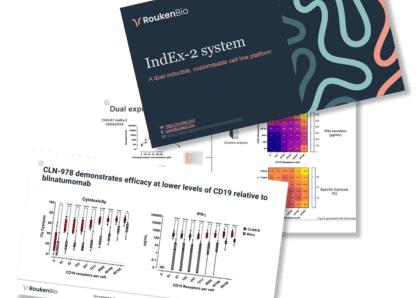Antigen density matters: Advancing immune-targeted cancer therapies
First presented at the NextGen Biomed 2025 conference, RoukenBio's Senior Study Manager and immunology expert Lynne Dunsford showcases our specialist immuno-oncology services.

|
April 2, 2025
|
2 min read
Assessing antigen density
A key challenge in developing tumour targeting therapies lies in identifying optimal tumour associated antigens.
These antigens aren’t often cancer specific. They are overexpressed on cancerous tissue but can also be found in healthy tissues.
Efficient treatment may be more difficult and contributes to immune evasion by tumours that downregulate the expression of the target antigen – termed ‘antigen escape’.
This applies to:
- Immune cell therapies
- Immune cell engagers
- Antibody-Drug Conjugates (ADCs)
- Multi-specific and bispecific antibodies
- Conventional mAbs
Using IndEx-2 and scIC
What would be the ideal system for measuring antigen density effect?
Our dual inducible system IndEx-2 is engineered to mimic tumour-associated antigen targeting, and is finely titratable over a dynamic range of expression (~100s-100,000s of receptors). The platform is particularly suited for CAR-T therapies and multispecific engagers.
Additionally, performing single cell Interaction Cytometry (scIC) with heliXcyto provides real-time, cell-trapped binding kinetics analysis – offering insight into receptor expression and avidity. This can influence therapeutic engagement, a crucial consideration for monoclonal antibody treatments.
Watch Lynne's presentation to learn more!
Join our community of curious minds on LinkedIn
🗓️ Stay informed with our monthly scientific newsletter, published on LinkedIn on the last Wednesday of each month.
These editions bring you the latest in drug development breakthroughs, industry trends, and expert insights from the brilliant minds at RoukenBio.
Subscribe today on LinkedInInterested in IndEx-2?
Find out more about our dual inducible cell line platform and how it's used to measure antigen density in drug discovery.
Access our slide deck

